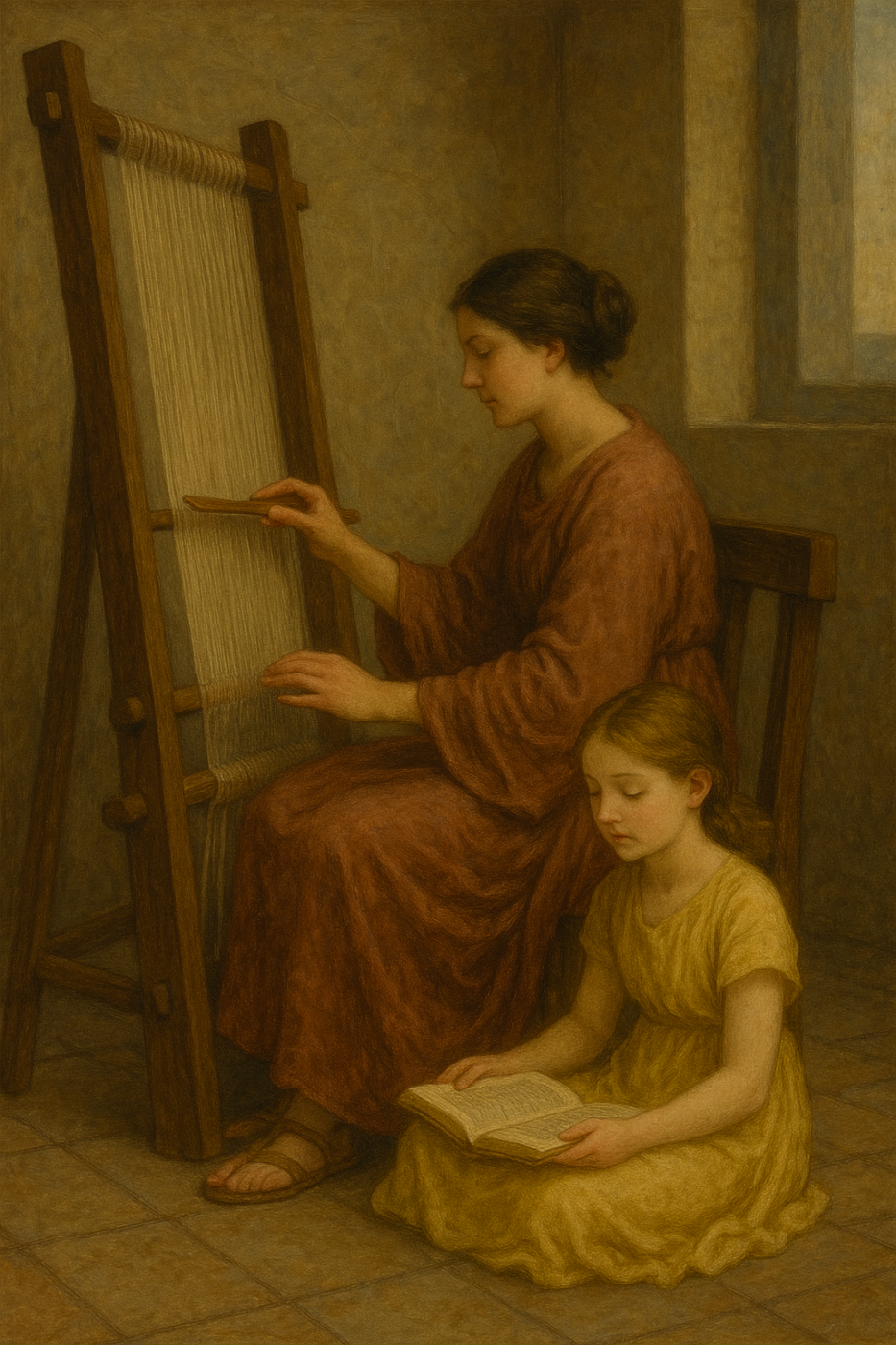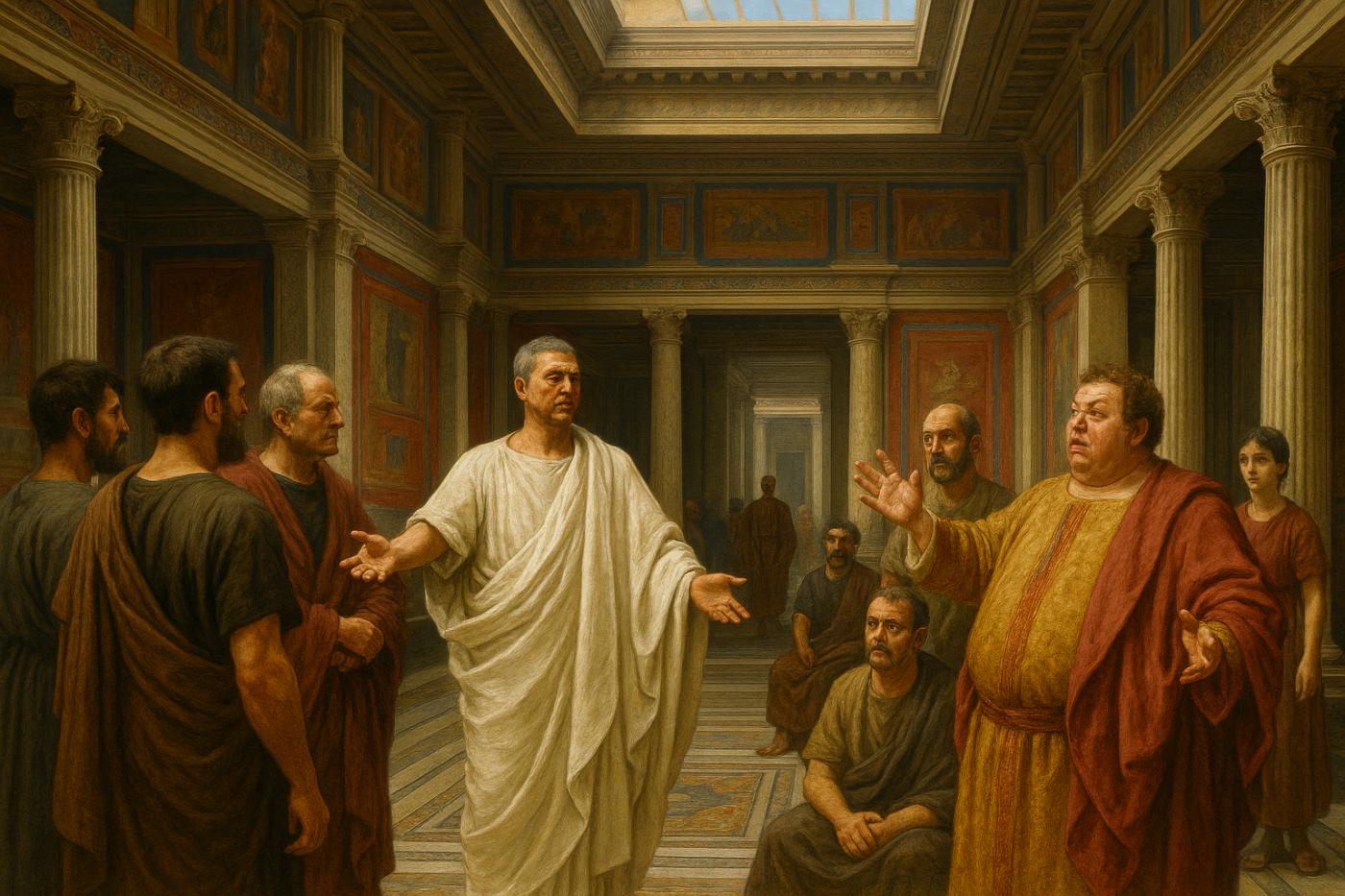Early in the morning, late in the Roman Empire, the city is quiet; this stifling August day has not yet broken. Young Aurelia stirs, briefly registering the rhythmic hum of household activity: sweet, doughy smells wafting up from the kitchens, the splish-splash of excitable fish just fed, linens flapping in the wind. Nutrix Nicia lightly pads towards the domus door, initiating the daily dance of the morning routine: she draws the curtains, gently chides Aurelia from her slumber, slots her, “arms up”, into her yellow tunic, and presents a plate of the just-baked bread dipped in gooey honey. Together they take their first paces towards the atrium, with Nicia, naturally, two steps behind.
Aurelia hovers in the shadow of an ample pillar, careful not to disturb the unfolding scene. Her sixth brother, Julius Caecilius Sextus, is in his natural, priggish state: lounging, a cup of wine in hand, chewing on cabbage leaves. His sunken eyes and split lip—far too bulbous for crocodile-dung concealer to hope to hide—plainly reveal the events of the night before: gambling and brawling, tumbling from taverna to taverna. Not even an ex-gladiatorial bodyguard can stop trouble from finding an obnoxious boy in his fifteenth year with too much gold in his coin pouch. Happily, Julius receives his just rewards from their father, Caceilius, who lectures him first on the public face of the family and then, again, demands he string a sobering emerald amulet around his neck for at least the next few days. Lest his drunken antics interfere with the household’s celebrations.
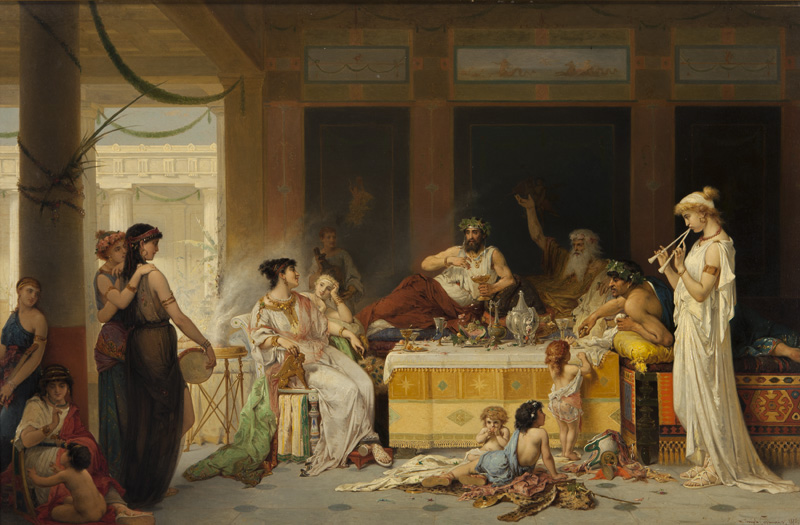
A painting of a Roman banquet by Pierre Olivier Joseph Coomans (1876)
The corners of the atrium thrum with activity, and Aurelia’s mother, Diana, is breaking a sweat; the three-day festival of Nemoralia—to honor her namesake, the goddess of the hunt—will arrive tomorrow, and with it the family’s annual feast. She must organize a spectacle of abundance; the family’s generosity, particularly when supplying barrels of fine Falernian wine, will be duly noted by all in attendance, but none more than the portly, expectant senators. Slaves oscillate in and out, ferrying linen samples and jugs of wine for tasting, while Diana weighs the relative merits of the menu—stuffed dormouse or parrot tongue stew? She settles on the dormouse, rolled in honey and poppyseeds, and consults Vettius Valens’s astrological work, Anthology, for counsel on the best time to bathe. Today, 4 PM proves most auspicious.
Despite all of the Nemoralia excitement, the politicking of the day must nevertheless persist; it is time for Aurelia and her mother to disappear. For the next hour, Caecilius will hold court in the atrium, and men of different stations will come and go. Some will be confident and swaggering, lodging political petitions, and some timid and deferential, requesting patronage. The former will inevitably include pie-faced Titus Stinkus, Aurelia’s politically advantageous future husband. There are only two years until she must marry him, and though she can technically refuse, his being pompous and smelly (the smothering effects of a heavy-handed approach to marjoram fragrance) is not quite a worthy reason—plus the scandal it might cause is an instant prophylactic.
At least for now, Aurelia remains an engaged woman in her tenth year, and in order to properly enter the public sphere, she must assemble the vast matrix of betrothal insignia that Titus has lavished upon her. Nicia sets to work anointing her with the loot: mermaid-gold armbands snake her arms, an ivory pin fastens her hair, four gold rings settle on her dainty fingers, a gold crescent necklace rests around her cream neck, gold bangles slot onto her wrist, pearl-studded earrings droop her lobes. Her mother sits opposite, supervising, while Ancilla, her lady’s maid, slathers a clumpy mixture of crushed earthworms and oil over her greying hairs.
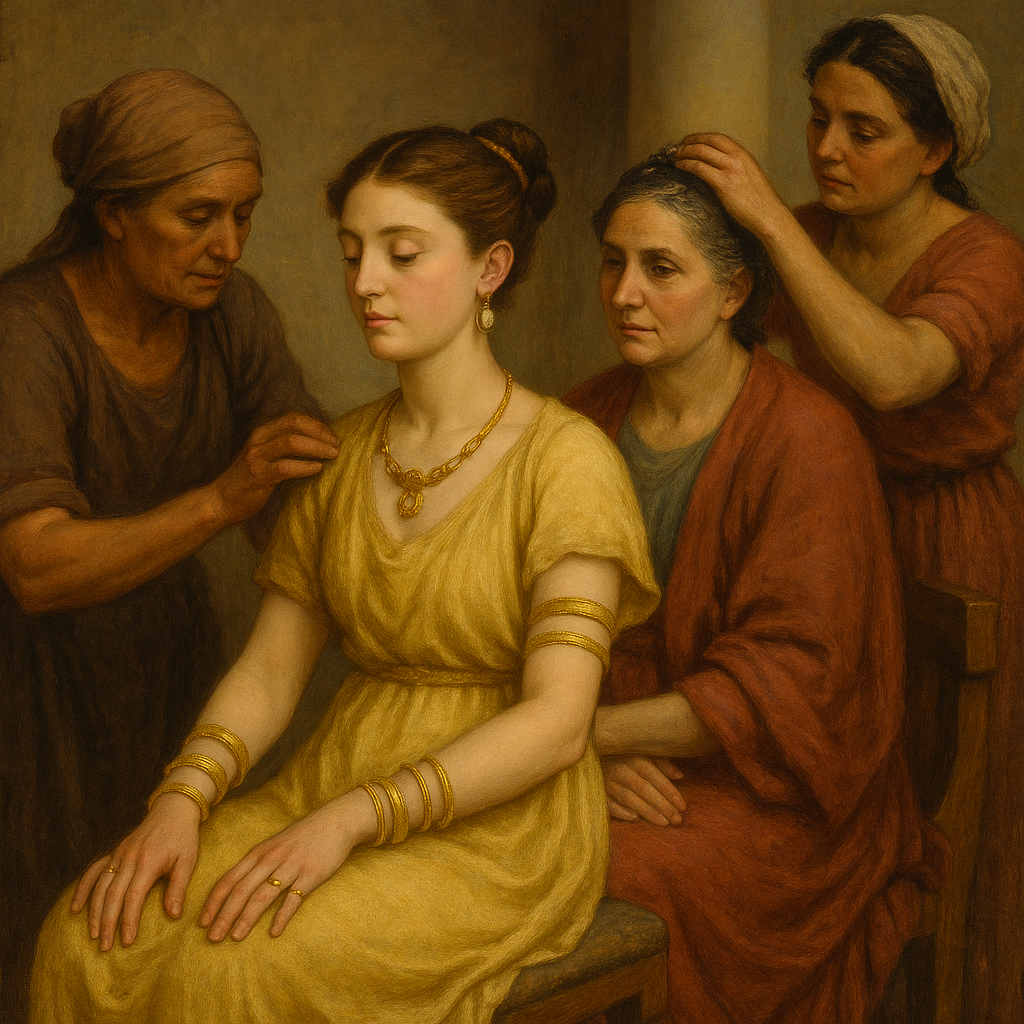
Nicia sets to work anointing Aurelia with the loot.
Diana, too, must consider her public face; while Caecilius is campaigning, it is imperative she is the physical embodiment of austerity, modesty, and virtuousness. Ancilla sets to styling Diana’s hair—with as much likeness to Empress Faustina as the gods will allow today—as her favorite member of the family, a miniature Melitan fluff-ball, Pamphagos, dozes in her lap. Her attention soon turns to gossip, gathering a steady wind as she prods Ancilla for information: apparently the Empress was caught bedding one of the young, virile gladiators-about-town, and Diana will stop at nothing to find the name of the lothario in question.
Following the strict instruction of Vettius Valens, Aurelia and Diana both adorn violet stolas, swill donkey urine mouthwash, and are, at last, ready to cross the threshold. The two ladies and little Pamphagos heave into the litter, four burly slaves hoist it atop their shoulders, and the gates to the compound swing open. A saturated sewage stench smacks Aurelia in the face; such is the summer reality of the dried-up Tiber River.
The litter starts its plod towards the city. Descending the Palatine hill, the heat of the day settles, stagnant and unrelenting, but ultimately no match for the hardy street salesmen, who sizzle sausages, perform magic tricks, and offer to read the fortunes of any lingering passerby. The litter navigates the twists and turns of the Suburra neighborhood, and at quite the inopportune moment, a cart dispute draws the street to an abrupt halt. This particular seedy street corner is illuminated by the sound of the gaudy propositions that toga-clad prostitutes yell from the windows. Diana promptly shrieks, clamping one hand over Aurelia’s eyes and dragging the litter’s tasseled curtains firmly shut with the other.
At last, Aurelia catches a glimpse of a decorated dome: the Temple of Vesta, their destination. Somewhere inside, Vesta’s flame endures—steadfastly keeping the Empire together—while Livinia continues to carry out her priestess training. By Aurelia’s calculations, her sister has been in the Temple for four years, so she has 26 left in active service. On this day, Livinia’s birthday, her mother continues the ritual of passing by the temple, holding on to the futile wish that they might catch a fleeting glimpse of her perfect daughter, the Vestal Virgin.
Aurelia struggles to remember the last time she saw Livinia; such was the tumult of the days leading up to her selection. The scene appears in flashes: the flame extinguished, a blanket of silence over the city, doomsday murmurings, a crescendo of gossip to the discovery that the priestess had soiled her sacrosanct body and was, indeed, a whorish Helen. Then the pale vacancy of the sacrificed priestess as she descended into a tomb to be buried, very much alive.
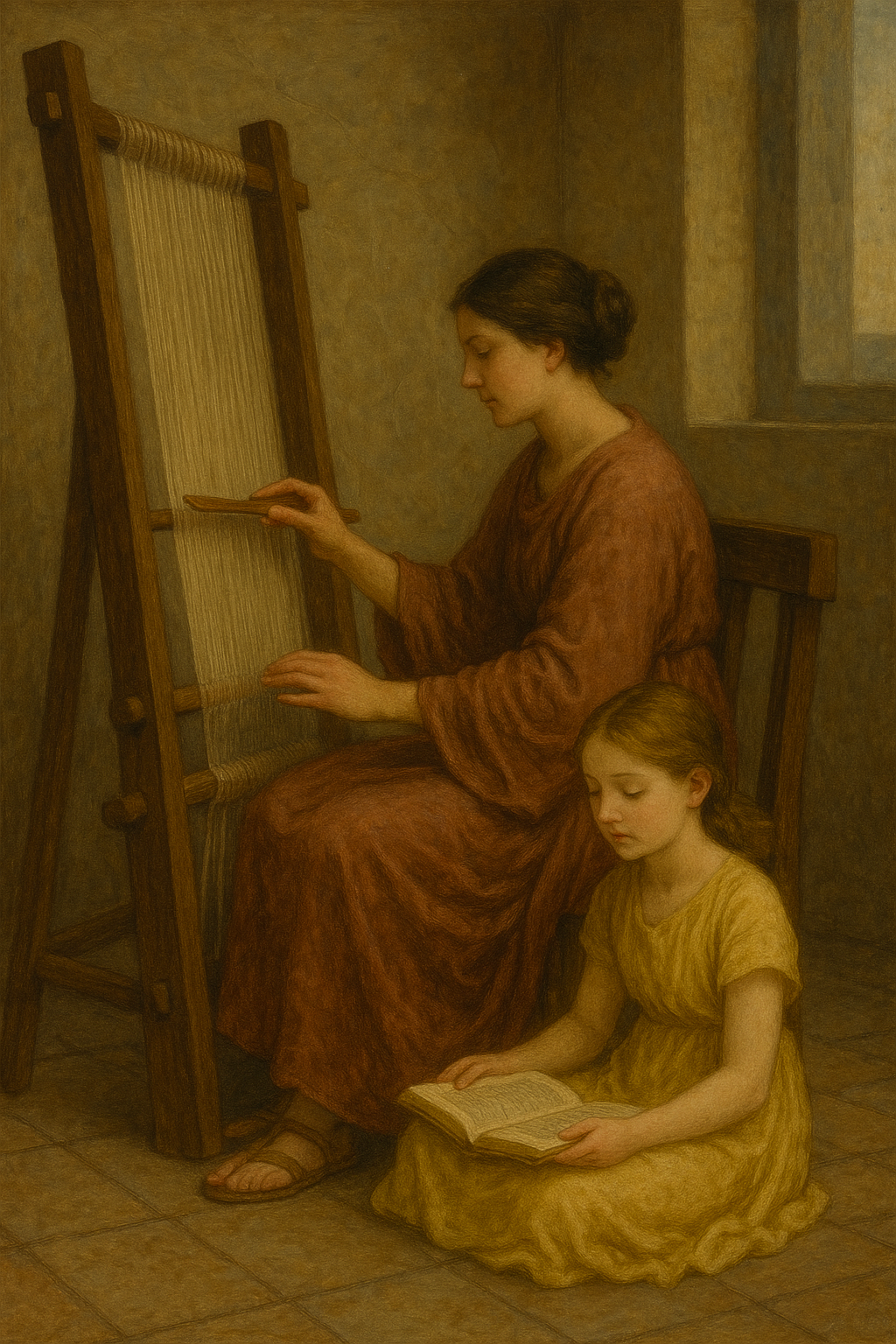
Diana takes to the loom, while Aurelia recites Greek verses.
Aurelia is snapped back to the present: the litter is ushered on. As they make slow progress, weaving back through the knots of the city’s traffic, Aurelia spots enormous red and black graffiti scrawled onto the side of various buildings. She registers the mood. Thankfully, there seems to be support for her father, the reformer: “populares; an honest man.”
When they get back, the villa is still; Caceilius and Julius will be at the baths by now. Diana takes to the loom, with Aurelia sat at her feet, reciting the Greek verses that her pedagogue will test her on tomorrow. Diana soon tires of her monotone conjugations, and Aurelia’s mind wanders to dinner, at which her father will regale them with stories from that day at the Senate, Julius will shovel oysters and place bets on the Nemoralia gladiatorial games, and her mother will be quiet, her mind no doubt on her beloved Vestal Virgin, who will have one of the best seats in the Colosseum.
Sitting quietly, Aurelia grabs her new ivory Venus doll and wonders who she might be. A freewheeling acrobat? A formidable empress? A fire-worshipping priestess? Another wife? In this particular Roman Empire there is but one choice, and with some resignation Aurelia’s doll starts a walk down the aisle that soon turns into a lollop—she too must bear the weight of engagement jewelery. With that, Aurelia makes a silent vow that the doll’s betrothed won’t have a face like a pie or stink of marjoram. That, if nothing else, she can control.

